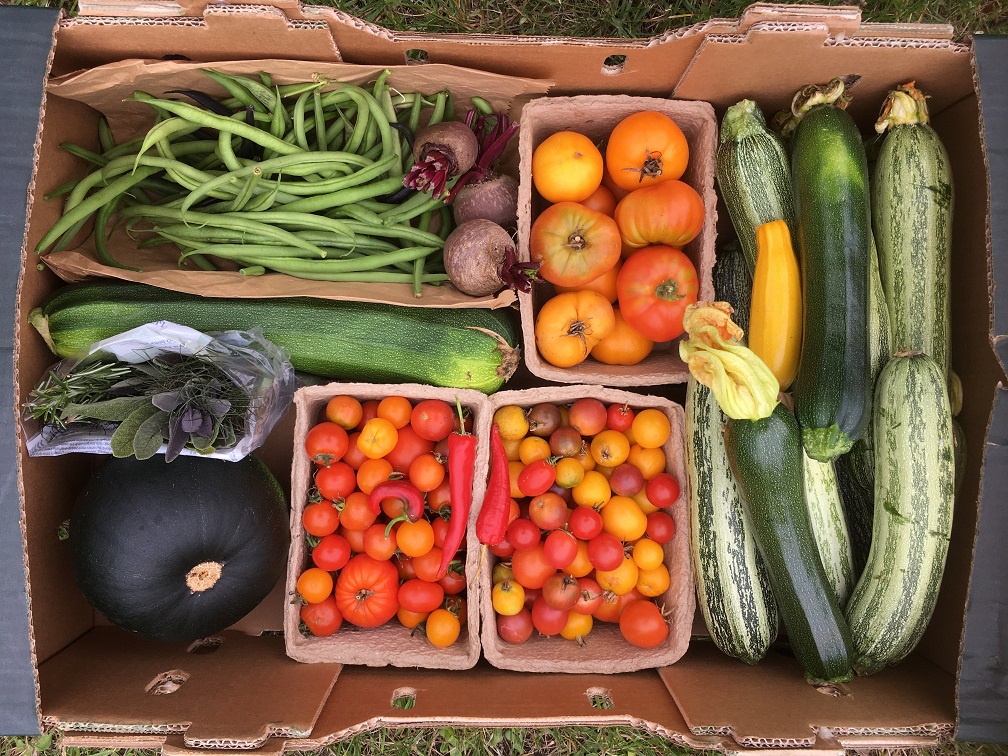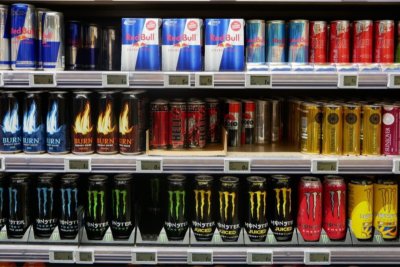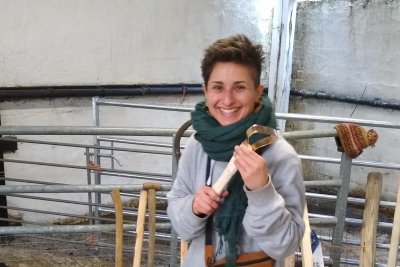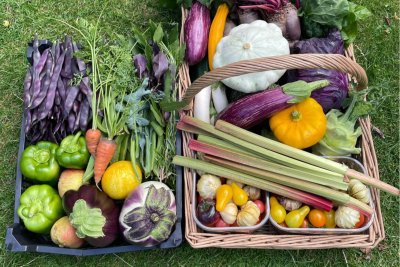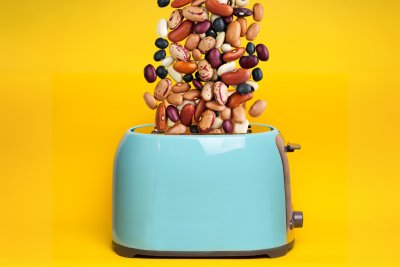Blogs • Sustainable Farming Campaign
Oxford’s Real Farmers take on retail: Looking at local food for 2022
With the last two years seeing a boom in box schemes and a renaissance in alternative retail, is 2022 set to see the market for local food grow further? And if so how might this happen? Where better to find out than from of the country’s leading local food practitioners and champions, speaking at last week’s Oxford Real Farming Conference. Ben Reynolds asked them what they hoped this year would have in store.
With more than 4000 people attending this year’s Oxford Real Farming Conference, the event has built to be one of the biggest in the sustainable food calendar, and online has enabled people from communities all over the UK and across the world to get involved. One thing that all have in common is the belief that agroecology needs to be at the heart of farming and land management if we are to find a way to sustainably feed ourselves whilst trying to get our impact on the planet back under control.
The urgent need to really start talking supply chains was well met at ORFC which was so great to see - now we need to get wider and deeper recognition of what agroecological infrastructure, supply chains and retail can really deliver. And the support to do it.
Vicki Hird, Sustain
Will 2022 be the year of the greener grocer?
With the number of sessions focusing on supply and retail doubling this year, the conference saw a much more concerted consideration of how we help more people to access this produce, and increase the demand as well as the supply. Reuben Chesters of Locavore in Glasgow challenged the audience and set the tone for many of the discussions that followed.
We have loads of people who want to be growers. We need a generation of agroecological shopkeepers.
So will this be the year of the ‘greener’ grocer as one attendee put it? Josiah Meldrum of British pulse and grain producers Hodmedods certainly thinks so:
My hope is that in the coming year we see an increased public and political understanding of the critical role agroecological retail has to play in supporting and sustaining positive change on farms.
So, can retail be agroecological? For those speaking at the conference, there was a belief that retail could certainly do more to support agroecology, alongside other concerns such as social justice and food sovereignty. Better Food Traders is a network of retailers that tries to do just that, and Natasha Soares from BFT hopes for 2022 are:
That all the brilliant farmer-focused retailers in the UK join Better Food Traders so we can link people within and across regions, and keep peer-learning, support and inspiration going, and start pushing back together against the centralised corporatisation of food retail. And that a whole load of rich famous people like Ed Sheeran start buying their food from a Better Food Trader and talking about it a lot, instead of buying up land.
You can read all about Mr Sheeran’s latest exploits in m’colleague Vicki’s blog. But first...
How can the local food movement better work together in 2022?
Many contributors at the conference pointed to the need for a more coordinated approach to strengthen local food systems in 2022:
Many in the local food and agroecological movement are making change happen and it’s exciting to see where we could be by 2030. To make that a reality, we need a cohesive and joined-up effort across the policy landscape that influences the food and farming system, rather than seeing a continuation of working in siloes.
James Woodward, Sustain
My hope for 2022 is that the sustainable food movement continues on its journey towards unity, togetherness and connectedness; working together we have the potential to transform food systems for the better.
Duncan Catchpole, Cambridge Organic Food Company
Indeed, in the recent process to inform the National Food Strategy, Sustain has championed the need for a growth plan for progressive retail with a focus on local food, which would bring together the sector behind a shared vision. And further afield, collaboration across national boundaries, as Rachel Arnould, of Data Food Consortium and CoopCircuits, encouraged:
As a French person my big hope for 2022 is that local food systems keep strengthening their link across the channel. We have so much to learn from each other: no Brexit will change that :)
Beyond the desire to work together, others have put forward ideas to what ends that might focus on, starting with publicity and promotion. Phil Haughton, of Better Food, a Bristol based enterprise, focusing on retail urged that this is the year we should:
Join together to produce an annual paper publication to celebrate all we do. Funded so we can give it to a million people to help all understand the importance of what we offer in tough times for health and planet.
Will 2022 see local food scaling up or scaling out?
Another key aim for the year voiced by many was the growth in scale of the local food movement. But the phrase scaling out rather than scaling up was used and picked up by many speakers. Helen Woodcock of The Kindling Trust, who support new farmers and local food systems in and around Manchester and who are aiming to find and buy a 100+ acre farm up in the Northwest. Helen also hopes this year:
That the movement continues to grow and strengthen, with more co-operative and community owned farms, growers, producers and traders leading the way in the ecological and social food revolution
For some, like Holly Gregson, of the Real Veg CSA run out of the pioneering Wakelyn’s farm in Suffolk this could come from the growth of specific models like Community Supported Agriculture:
We hope for the flourishing of new CSAs to continue like it has done in the last few years of lockdown. That we continue working towards us all being in walking distance to where our food grows.
The conference heard how different approaches or models like this might provide flexible ways to achieve this growth to suit different contexts and communities. Where for some enterprises like Better Food, the aim is to support more retail outlets, others like Locavore have found their key to success is to diversify into running different complimentary enterprises to their retail outlet, including wholesale, cafes, box schemes. In Devon, the Good Food Loop SW has seen an inter-relationship build between four independent food hubs, that through a weekly collection loop have extended the reach of each hubs individual producers, and provided a greater range to customers. This concept of inter-connection or a ‘local food ecosystem’ is advocated by Duncan Catchpole, based on his own work in Cambridge; something he is keen to help others develop over the coming year.
For Clare Horrell, of the Real Farming Trust, organisers of the conference, this diverse web of enterprises needs to include caterers, with opportunities this year for advances in the wa public procurement supports local food systems:
It would be great to see dynamic procurement gaining traction and funding. We need more central government support to really move this forward. We all know IT systems don’t come cheap so without proper support it will either not happen or create something that isn’t fit for purpose.
This need for improved infrastructure not only of a physical but a digital kind, is what Lynne Davis, of the Open Food Network hopes 2022 will see the development of:
I hope that in 2022 we recognise supply chains (or more specifically distributed, coordinated supply networks) as a critical piece of the puzzle for agroecological transformation. So that we can build the infrastructure, gain the investment and develop the appropriate governance together as a movement.
How can 2022 make local agroecological food accessible for all?
Other speakers at the conference hope that 2022 will be the year that extends the reach of local food. As Clare Horrell explained this should be:
Not just in supporting the growth of more projects but also in terms of who they provide food for, the farmers they support and how they relate to their location and the people who live in it.
This view was echoed by Kath Dalmeny of Sustain who hopes:
We can make serious progress on how to enable more people from diverse ethnic backgrounds to have access to land and food growing, enabling everyone to benefit from diverse cultures and joyful engagement with good food production, shared equitably. Oh, and PLEASE can we dig up Jacob Rees-Mogg’s lawn and plant carrots?
Will 2022 see Government step in to support local food systems?
Whilst the specifics of her last point might be a little in jest, the importance of a political focus to the aims of local food were a common theme for many of the conference speakers. Their hopes:
That National & Local politicians start to look seriously at the Wins for society, the environment & local economies - jobs where people live, homes where people work, space made for local food on National shelves & re-investment in County farms as primary supply bases for public procurement.
Andy Johnson, Organic Business Adviser
That local food is recognised as the lynchpin in national and local government's work on climate change and strong local economies and they start to talk more about food not just transport and buildings.
Marisa Heath - Abbatoir Sector Group
That this is the year that Government recognise that to make genuine progress on re-establishing robust, resilient and functional local supply chains, for the benefit of public health, planetary health and future generations, policy decisions and regulation must focus first and foremost, not on commodities being exported to a market on the other side of the world, but on locally-grown food, sold directly to consumers who trust how it has been produced, and that this will be the post-Brexit ‘Gold Standard’.
Peter Greig, Pipers Farm
Your thoughts?
What is your top wish for local food in 2022? Any thoughts on the ideas shared here? What have we missed?
Join the conversation on Twitter and Facebook – and don’t forget to tag us @UKSustain so we can read and share your thoughts too!
Published Monday 10 January 2022
Sustainable Farming Campaign: Sustain encourages integration of sustainable food and farming into local, regional and national government policies.
